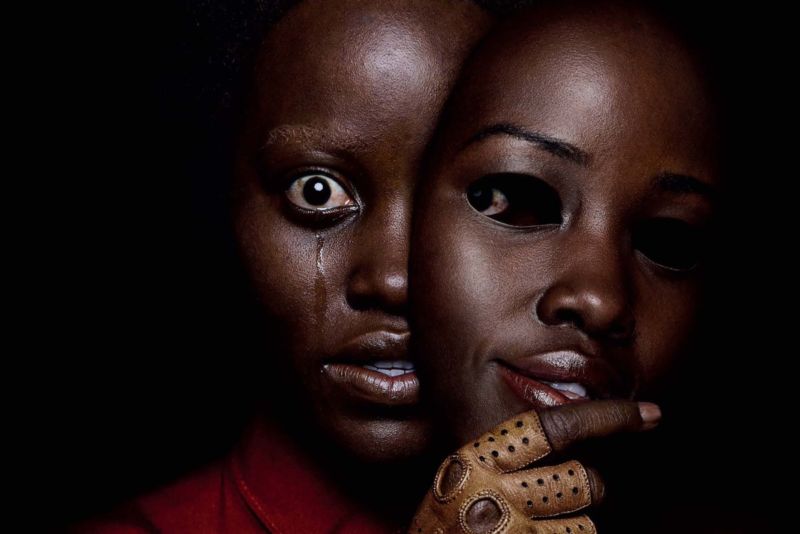
A family is terrorized by their own doppelgängers while vacationing in Santa Cruz in Jordan Peele's new film, Us. With its spot-on writing and pacing and fantastic performances from its ensemble cast, the film should cement Peele's status as a master of modern horror.
(Mildest of spoilers below, because anything more would spoil the fun.)
Us is the much-anticipated follow-up to Get Out, Peele's surprise box office hit that earned more than $250 million and snagged Peele an Oscar for best original screenplay—the first time the award has gone to a black recipient. Get Out is a subtle exploration of racial tensions that quietly builds to reveal its horrifying premise and inevitably bloody conclusion. In Us, the theme isn't so much racial tension—it's exploring, in Peele's words, the myriad ways in which "we are our own worst enemies."
Adelaide (Lupita Nyong’o) and Gabe (Winston Duke) Wilson take their two kids (Shahadi Wright Joseph and Evan Alex) to the beach to relax and unwind with friends (one of whom is played by Elizabeth Moss). Their young son, Jason, encounters a strange figure on the beach, and that night four more mysterious figures show up at the Wilson's summer house. They break in, and that's when the real terror begins—those figures are creepy doppelgängers of each family member. (Peele calls them "the Tethered.")
-
Elisabeth Moss plays Kitty Tyler. She and her husband join the Wilsons for a day at the beach in Santa Cruz.Universal
-
Did something sinister follow the Wilsons home from the beach?Universal
-
Strange figures dressed in red and holding hands.Universal
-
"They're us." Dark, twisted mirror images.Universal
-
Jason (Evan Alex) with Pluto (also Evan Alex), his Tethered doppelgänger.Universal
-
Kill it with fire!Universal
-
Adelaide Wilson (Lupita Nyong'o) will stop at nothing to protect her family.Universal
It's a classic kill-or-be-killed horror scenario for much of the film's second act, with plenty of jump scares and just enough snippets of humor to keep things from getting too heavy. (I loved the various family members arguing about who had the highest kill rate.) But Peele could never just leave it at that; he's always got a few more tricks up his sleeve. This time the twist involves a network of abandoned underground tunnels, a secret laboratory, Jeremiah 11:11, and a demented take on the 1986 campaign to battle world hunger, Hands Across America. To say anything else would spoil the fun.
The hot takes and think pieces are already starting to emerge about what Us ultimately "means," especially to analyze the final twist at the end (telegraphed early on for the eagle-eyed viewer). Is the film a metaphor for the darker, violent aspects of our individual natures? Or, does it say something about "the unseen underbelly lurking beneath every sunny American dream"? Maybe the film's a story about ascending from your own personal hell or the stigma of mental illness? Can it be an elaborate commentary on capitalism, slavery, and rising up to overthrow one's oppressors? If none of that rings true for you, Peele's film can certainly be enjoyed as top-notch horror entertainment, with no need for a deeper meaning.
“The feeling that we all feel we are the good guy in our own story prevents us from facing our demons.”
Take your pick. That's the advantage of Peele's decision to keep things just ambiguous enough to leave room for lots of personal interpretation and speculation. What is Us ultimately about? Well, what do you think it's about? It acts as a mirror for the audience. That aspect may frustrate some viewers who like a neatly packaged ending, but I found that the uncertainty and unanswered questions kept me reflecting on what I'd just seen for much longer than the average film. The questions enrich the overall experience.
That's not to say Peele doesn't have his own broad take on his movie's themes. “The feeling that we all feel we are the good guy in our own story prevents us from facing our demons,” he recently told the Los Angeles Times. “I wanted to make a movie that allows everybody to face their demons, in whatever faction you want to put this movie through the prism of. But as a starting point ... the United States and our xenophobia was the front and center idea to grapple with.”
Like Get Out, this is horror that makes you think, and it's already doing brisk business at the box office. That said, Us doesn't quite scale the artistic heights of its Oscar-winning predecessor. In particular, its ambitious larger premise starts to strain one's willing suspension of disbelief to the breaking point in the third act. But ultimately, this is still a fine, satisfying, highly creative piece of filmmaking that makes us all the more keen to see what Peele does with his forthcoming Twilight Zone reboot on CBS All Access.
https://arstechnica.com/gaming/2019/03/jordan-peeles-us-should-cement-his-status-as-a-master-of-modern-horror/
2019-03-22 18:45:00Z
52780242659468
Tidak ada komentar:
Posting Komentar